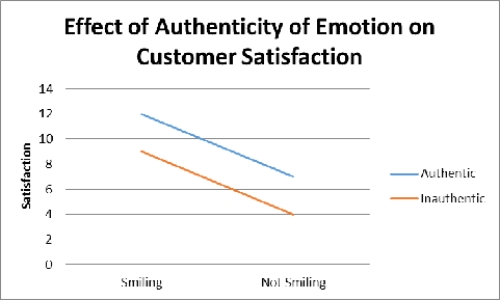Use the following to answer questions
Scenario I
Scenario I is based on fabricated data inspired by the following study:
Hennig-Thurau, T., Groth, M., Paul, M. & Gremler, D. D. (2006) . Are all smiles created equal? How emotional contagion and emotional labor affect service relationships. Journal of Marketing, 70, 58-73.
Do Smiling Employees Improve Customer Satisfaction?
In this 2 × 2 between-subjects design, Hennig-Thurau and colleagues examined the effect of employee emotions and authenticity of the emotion on customer relations. A total of 223 undergraduate volunteers participated in this study. The participants were told they would be testing a new movie consulting service. The movie consulting service was created by the experimenters, and actors were hired to act as customer service representatives. Each participant approached the service desk where the actor asked them a number of questions  Figure 1. Customers rate their experience more favorably when employees are smiling.
Figure 1. Customers rate their experience more favorably when employees are smiling.
-(Scenario I) Suppose each treatment condition described in Scenario I was conducted sequentially with the first treatment tested in the fall semester, and the second in the spring semester. Following testing all treatment conditions the participants received payment for their participation in the form of a gift card. Some received a gift card to a coffee shop and others received one to a megastore. Along with their gift card, participants also received a statement debriefing them of the actual intent of the study. Which of the following presents a potential confound?
Definitions:
Achievement
The accomplishment of a goal or attainment of higher skill levels through effort or skill.
Erikson
Erik Erikson was a developmental psychologist and psychoanalyst known for formulating the theory of psychosocial development outlining 8 stages that describe how individuals evolve through the lifespan.
Psychosocial Development
A theory that describes the stages an individual goes through in the development of personality, emotions, and social relationships.
Cognitive Development
The process of growth and change in intellectual capabilities such as thinking, reasoning, and problem-solving that occurs from infancy to adulthood.
Q2: What is programmatic research and why is
Q4: What is the overall purpose of program
Q6: Why is a pretest-posttest design considered a
Q8: Eric wants to verify that automatic toothbrushes
Q8: _ is when one independent variable's influence
Q9: (Scenario III)To conclude that jealousy is greater
Q9: What is the focus of a program
Q10: Key findings of program evaluations tend to
Q11: What is the importance of having baseline
Q87: Berma wants to conduct a study on